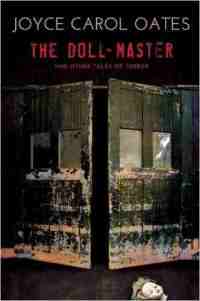
Published by Mysterious Press on May 3, 2016
Joyce Carol Oates always creates strong characters, but she is particularly adept at working her way into the minds of troubled children and their dysfunctional parents. Many of the stories collected in The Doll-Master showcase that talent. While the subtitle suggests that these are “tales of terror,” many are tales that explain why people do terrible things. Others focus on the fear of terror more than the terror itself.
“The Doll-Master” is a story about Robbie, whose younger cousin Amy died of leukemia just after she turned three. Afterwards, Robbie stole Amy’s doll. When his father took the doll away (because it’s not good for boys to play with dolls), Robbie was displeased, to say the least. It soon becomes clear that Robbie is a deeply troubled, unreliable narrator, whose infatuation with dolls conceals a deeper, more troubling obsession. The story is suitably creepy, revealing the inner workings of a demented mind, in a fashion that will be familiar to fans of Oates’ unsettling fiction.
“Soldier” is written from the perspective of a man who is being held in custody as he awaits trial, having been accused of being a “rabid racist murderer.” Whether the story’s narrator acted in self-defense is the initial mystery, but the bigger mystery is why so many people in the community turn him into a soldier for their particular cause. As she often does, Oates works her magic to make the reader understand the naive narrator, probably better than he understands himself, and to understand how private tragedies explode into political theater.
More than two dozen years after a shooting death, a woman in “Gun Accident” is trying to come to terms with her actions when, as an insecure girl, she was pleased to be asked to take care of her teacher’s house while her teacher was visiting her hospitalized husband. The story’s title summarizes the plot, but Oates builds suspense from the opening paragraph, inviting the reader to imagine how one awful event will change the girl’s life.
On the vacation described in “Equitorial,” the character known as “the wife” fears that the character known as “the husband” is trying to kill her, easing the way for yet another transition to a younger replacement wife. Fear grips her in Quito. She loses it in Galapagos but regains it on a cruise. The beauty of this story is its ambiguity. Is the husband having an affair or not? Is he planning to kill the wife or is she being paranoid? Readers who deplore uncertainty may not like this story, but Oates is making the point that life is uncertain and that it is often impossible to recognize the difference between founded and unfounded fears.
A friendless child makes the wrong kind of friends in “Big Momma.” The story plays on fears of child (and pet) abduction. This seemed to be a predictable story until it took a wild turn. “Big Momma” is probably the creepiest of the stories collected here.
“Mystery, Inc.” was published as part of the Bibliomysteries series and is reviewed here.
RECOMMENDED